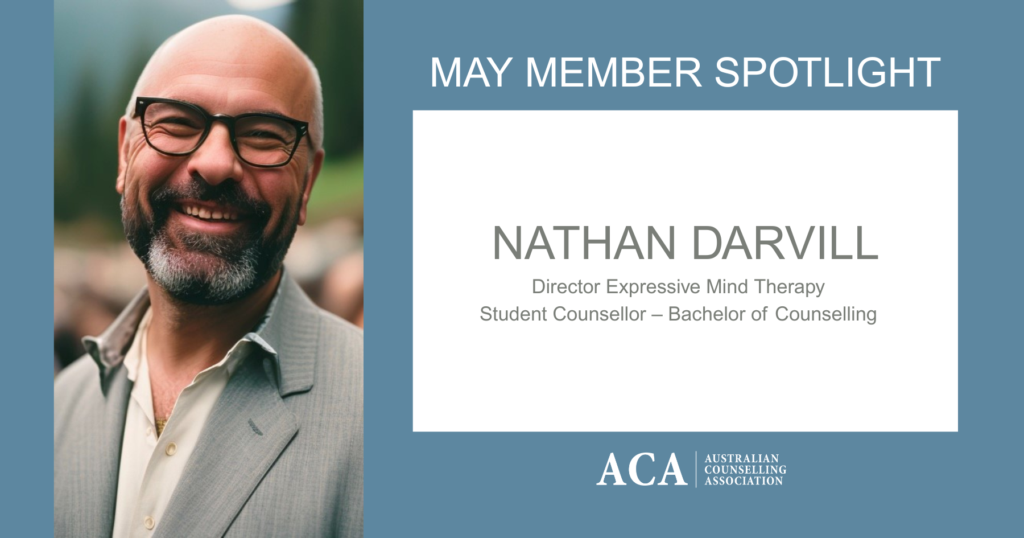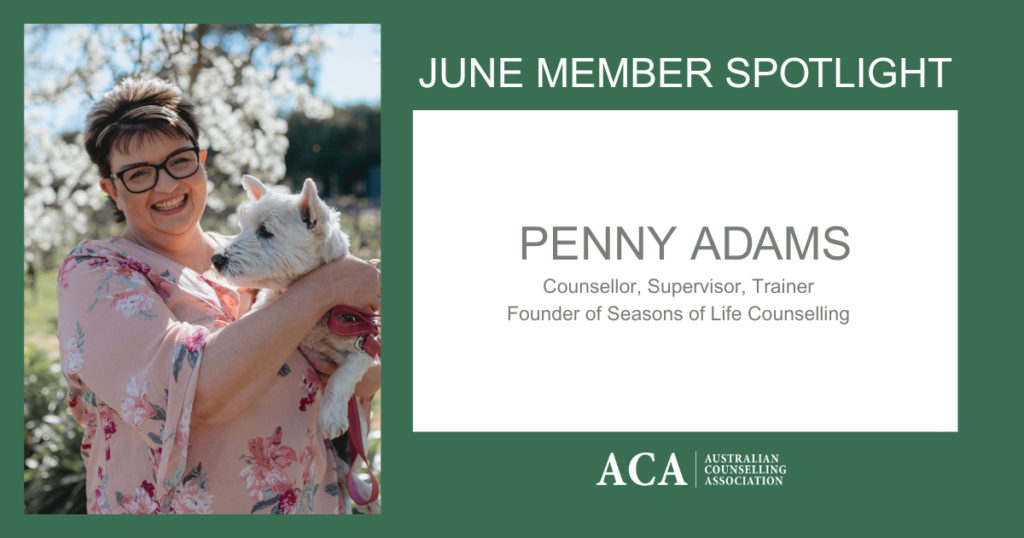Meet Nathan Darvill
Each month we spotlight an ACA member in the ACA Monthly Bulletin, our monthly newsletter. The Member Spotlight is designed to showcase the work of our members to you! We hope their stories inspire or spark interest. Let’s share our experiences within our counselling community.
What motivated you to pursue a career in counselling?
After serving for over two decades in the Royal Australian Navy, including operational deployments that exposed me to both trauma and resilience, I felt a strong calling to serve in a different capacity—one grounded in healing, empathy, and connection. My transition into counselling was deeply influenced by my personal experiences with trauma, crisis intervention, and mentoring others throughout my military career. These encounters, paired with a lifelong desire to create space for others to feel seen and heard, became the catalyst for my journey into professional counselling. I believe in the power of stories, and I wanted to be someone who not only listened but walked alongside people as they reclaimed their lives.
Are there any particular areas of counselling that interest you most?
I’m especially passionate about trauma-informed care, crisis counselling, and supporting individuals with neurodivergent needs. I’m particularly drawn to working with veterans, first responders, and men’s mental health—areas where stigma still too often silences suffering. I’m also excited to continue my journey in the autism and neurodiversity space, having recently been accepted into the Master of Autism and Neurodiversity at the University of Wollongong. As a father of five, I also deeply value supporting families and young people through early intervention and strengths-based approaches.
Can you share a recent achievement that you're proud of?
One of the most meaningful achievements has been founding an allied health company—Expressive Mind Therapy—on the South Coast of NSW. We support NDIS participants across a broad spectrum of needs and advocate for accessible, trauma-informed, and holistic care. Balancing this while completing my Bachelor of Counselling, mentoring peers, and accumulating over 750 hours of work experience through one-on-one, crisis, and mental health counselling has been no small feat—but it has affirmed my passion and capacity for this work.
What do you find most meaningful or rewarding about becoming a counsellor?
For me, it’s the privilege of sitting beside someone during some of their most vulnerable moments and helping them rediscover their strength, purpose, and hope. It’s not about fixing people—it’s about empowering them to find the answers within themselves. The trust people place in us as counsellors is something I never take lightly. That human connection—that reminder of our shared humanity—is profoundly meaningful.
How do you see yourself contributing to the counselling profession or your community in the future?
I hope to continue breaking down barriers, particularly around stigma in male mental health and veteran services. I want to amplify voices that are often overlooked—whether it’s rural communities, neurodiverse individuals, or those navigating crisis and trauma. Through Expressive Mind Therapy and ongoing education, I aim to create integrated, person-centred services that blend therapeutic best practice with authentic, lived experience.
Are you currently involved in any initiatives, projects, volunteering, or placement experiences?
Alongside running my allied health practice, I’ve completed counselling placements supporting clients with complex and diverse needs, including psychosocial disabilities, trauma histories, and crisis intervention. These experiences have shaped my therapeutic style and deepened my commitment to person-centred, strengths-based care.
In 2024, I was honoured to be invited as a keynote speaker at the Australian & New Zealand Mental Health Association’s Rural Mental Health Conference—a significant milestone for a student counsellor. It was a powerful opportunity to share my lived experience and professional insights, particularly on trauma, rural mental health, and access to support services in regional areas.
More recently, I began my role as a member of the Suicide Prevention Australia Lived Experience Board, where I contribute to national suicide prevention strategies and advocate for more inclusive, compassionate systems of care.
I’ve also been actively involved in national conferences, advocacy panels, and training initiatives that promote mental health awareness—particularly within the NDIS and addiction recovery sectors. In addition, I continue to support and attend ACA conferences and symposiums, which further enrich my professional development beyond my academic studies. These experiences have provided invaluable opportunities to network, learn, and grow within the profession I am so passionate about.
I’m deeply committed to lifelong learning, and being engaged in real-world settings ensures my work remains grounded, responsive, and informed by both research and lived experience.
What advice would you give to other students or anyone considering studying counselling?
Jump in—but do it with heart. This isn’t just a profession; it’s a calling. Be ready to challenge your assumptions, confront your own stories, and grow in ways you never expected. Your life experience matters. Whether you’re young or coming to this path later in life—as I did—it’s never too late to create change. Lean into community, supervision, and reflection. You’re not alone in this journey.
Is there a quote, idea, or philosophy that motivates you?
“Be the person you needed when you were younger.” That quote guides everything I do. Whether I’m in session, mentoring a peer, or leading my team—it reminds me to show up with empathy, courage, and authenticity. We all carry something, and sometimes, all it takes is one person to believe in you to spark change.
Open question - tell anything that was not asked in the previous questions?
People often ask me how I manage it all—fatherhood, study, running businesses, and therapeutic practice. The truth is, it’s not about being superhuman. It’s about being deeply passionate and purposeful. My military background taught me discipline, but counselling taught me vulnerability. I’ve learned that strength isn’t about powering through—it’s about pausing, listening, and meeting people where they’re at. I bring that mindset into every session, every decision, and every conversation I have. I’m excited about where this profession is heading, and I’m honoured to be part of the next wave of counsellors making a difference.




